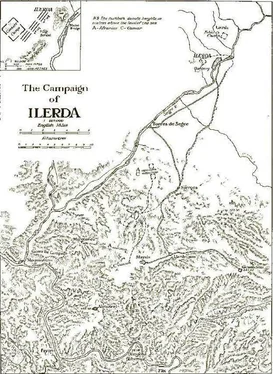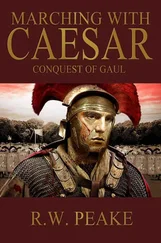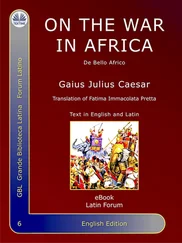R. Peake - Marching With Caesar – Civil War
Здесь есть возможность читать онлайн «R. Peake - Marching With Caesar – Civil War» весь текст электронной книги совершенно бесплатно (целиком полную версию без сокращений). В некоторых случаях можно слушать аудио, скачать через торрент в формате fb2 и присутствует краткое содержание. Жанр: Исторические приключения, на английском языке. Описание произведения, (предисловие) а так же отзывы посетителей доступны на портале библиотеки ЛибКат.
- Название:Marching With Caesar – Civil War
- Автор:
- Жанр:
- Год:неизвестен
- ISBN:нет данных
- Рейтинг книги:5 / 5. Голосов: 1
-
Избранное:Добавить в избранное
- Отзывы:
-
Ваша оценка:
- 100
- 1
- 2
- 3
- 4
- 5
Marching With Caesar – Civil War: краткое содержание, описание и аннотация
Предлагаем к чтению аннотацию, описание, краткое содержание или предисловие (зависит от того, что написал сам автор книги «Marching With Caesar – Civil War»). Если вы не нашли необходимую информацию о книге — напишите в комментариях, мы постараемся отыскать её.
Marching With Caesar – Civil War — читать онлайн бесплатно полную книгу (весь текст) целиком
Ниже представлен текст книги, разбитый по страницам. Система сохранения места последней прочитанной страницы, позволяет с удобством читать онлайн бесплатно книгу «Marching With Caesar – Civil War», без необходимости каждый раз заново искать на чём Вы остановились. Поставьте закладку, и сможете в любой момент перейти на страницу, на которой закончили чтение.
Интервал:
Закладка:
We were not withdrawing, although it looked like we were. Caesar’s scouts had surveyed the ground well, determining that there was a route that would allow us to swing us past the Pompeian camp, thereby putting us directly between them and the defile, through which ran the only passage to the boat bridge. The problem with that route was that it was over extremely difficult ground, littered with small ravines and crumbling fingers of land that oftentimes forced us to clamber hand over hand, with our comrades helping us up the steep sides. Fairly quickly, the Pompeians realized their error, and despite the distance, we could hear the cries of alarm echoing over the hills as they scrambled to cut us off. There began a race of sorts, with Afranius leaving his own baggage behind in camp, with some Cohorts to guard it, beginning a parallel march, creating a plume of dust that contrasted with our own, marking our respective progress. Both sides put everything into the pursuit but Afranius had the added disadvantage of being harried by our cavalry, whereas his own was of such poor quality that he did not even bother sending it at us. Despite the rough terrain, we drew ahead of the Pompeians, arriving at the mouth of the defile gasping for breath and barely able to stand erect, but nonetheless we made ready for Afranius to attack.
Afranius obviously knew the folly of trying to force his way through the mouth of the defile, because he halted his men some distance away. For almost a third of a watch, neither side moved, which we were thankful for since it allowed us to catch our breath. Afranius’ problem was that as narrow as the defile was, he could not bring his entire force to bear in an assault, instead being forced to feed his Legions in piecemeal even as they were chewed up. Also in our favor was the fact that so steep were the sides of this narrow canyon that we did not have to worry about anyone trying to swing around to come down on either flank. For that reason, the Pompeian commanders retreated to a nearby small hill to stop and consider their options, which were precious few. Off to their right and to our left was the highest peak in the area, off the shoulder of which ran a ridgeline that, if they could gain that peak, they could then follow all the way down to the confluence of Sicoris and Ibis. From there, it was a short distance to the boat bridge. Accordingly, Afranius ordered about four Cohorts to strip down to just their weapons, in order to give them every possible advantage of speed, sending them in a dash towards the base of the mountain. Now, for a short distance, a man can actually outrun a horse because they start much more quickly. Unfortunately for these men, the distance they had to cover was more than a mile, and even with a head start, they were doomed from the beginning. The moment it became clear what they were about, Caesar sent the cavalry in pursuit. Swinging wide of the main Pompeian force, they fell upon the running Cohorts more than a quarter mile short of the slopes of the hill. The slaughter was quick, and it was complete; not one man escaped, the cries of despair and curses of the Pompeian forces carrying clearly to us across the distance. Despite the fact that these men were the enemy, none of us felt like cheering the sight of brave Romans being cut down, especially when we all knew that there might be childhood friends or kinsmen among them.
Once more, we were at a stalemate; our army commanded the ground through which the Pompeians must pass, and now they were cut off from their supplies. The only thing in their favor was the fact that they had chosen a hill with steep sides, meaning that assaulting it would be difficult but not impossible. Despite the challenges, the senior Centurions went to Caesar in a group, urging him to allow us to assault the hill, thereby stopping this war once and for all. Caesar listened politely, but he refused to give in to our pleading, saying simply that he believed he could win this war without losing another drop of blood, either from his own men or from those of the enemy. For the first time since I had marched under the eagle, and marched with Caesar, men openly disagreed with him, and while I do not remember exactly who said it, I do remember hearing something that shocked me to my very core.
“Caesar, remember this moment,” the voice rang out. “The next time you call on us to fight for you, you may find that we’re not as willing as we are today.”
I was stunned, but what was even more shocking to me were the mumbles of agreement from a large number of the other Centurions. While I might have expected such sentiments from the rankers, I was completely taken aback that the most senior members of Caesar’s army would dare to say something so brazen, or to openly agree with it. Almost immediately after the words were spoken, the very air seemed to change, the import of what was said immediately hitting all of us, and you could almost hear the intake of breath sucking the air out from around us, the grumbling immediately ceasing as all eyes turned to Caesar. Whether or not that was how some of us felt, we also knew that to openly disagree in such a manner was an invitation to the harshest punishment available to a commander, and Caesar would have been well justified to order the Centurion who made this threat seized and executed on the spot. However, Caesar did not appear to be in the least perturbed, instead saying gently, “I understand your frustration, comrades, but these are my orders, and I know that you won’t let your personal feelings interfere with your duties. As far as the next time, and whether you choose to take up arms at my command,” he finished dryly, “I’ll have to cross that bridge when I come to it. I’ve already crossed the Rubicon, so one more won’t make much difference.”
His words had the desired effect; despite the tension, his attempt at humor was met with appreciative chuckles, and in that instant, the situation was defused. Returning to our areas in small groups, I chose to walk alone. I was extremely troubled by what I had just heard, on a number of levels. It had not even occurred to me to question Caesar’s judgment, but it obviously had to several of my comrades, men that I respected a great deal. Was my loyalty to Caesar blinding me? I could see the sense of what the others wanted him to do; what better way to end this war but to march up that hill and end it the best way we knew? Nevertheless, I had such faith in Caesar’s judgment that I never stopped to question whether he might be wrong. That was something that my comrades obviously had done, and it worried me. Would they really carry out their threat the next time he called for us to come to arms?
~ ~ ~ ~
We spent another entire day waiting for the situation to develop and thanks to our cavalry, who had gone back to our original camp to escort our supply train back, we were not in the same predicament that the Pompeians were, stuck on their hill, and cut off from their own supply base. The other problem for the Pompeians was water, more accurately the lack of it, and they began sending out Century sized detachments out to try finding the precious liquid. We were in the part of the country that is exceedingly dry in the summer months, and almost all of the streams that fed into the nearby Sicoris were completely dry. The natives used man made reservoirs to catch rainwater, and the Pompeians located one such reservoir some distance from their camp on the hill. Rather than risk continual capture of their detachments, they made the decision that it was ultimately safer and more secure to dig a ditch and throw up a rampart leading all the way from their camp to the nearest reservoir, a reservoir that we ourselves were using. This ditch traveled more than a mile in length to the reservoir, terminating on the opposite side, but our camp was situated in such a manner that the water was a distance of just a few paces from the gates of the camp. Therefore, we were on one side of the reservoir and the Pompeians on another, yet it was a matter of not much time before some of the men began talking to each other. As we had known all along, acquaintances and kin were discovered in each other’s ranks. What happened next marks the tragedy of civil war more than any other event that I saw or heard about during that period, at least in my mind.
Читать дальшеИнтервал:
Закладка:
Похожие книги на «Marching With Caesar – Civil War»
Представляем Вашему вниманию похожие книги на «Marching With Caesar – Civil War» списком для выбора. Мы отобрали схожую по названию и смыслу литературу в надежде предоставить читателям больше вариантов отыскать новые, интересные, ещё непрочитанные произведения.
Обсуждение, отзывы о книге «Marching With Caesar – Civil War» и просто собственные мнения читателей. Оставьте ваши комментарии, напишите, что Вы думаете о произведении, его смысле или главных героях. Укажите что конкретно понравилось, а что нет, и почему Вы так считаете.












